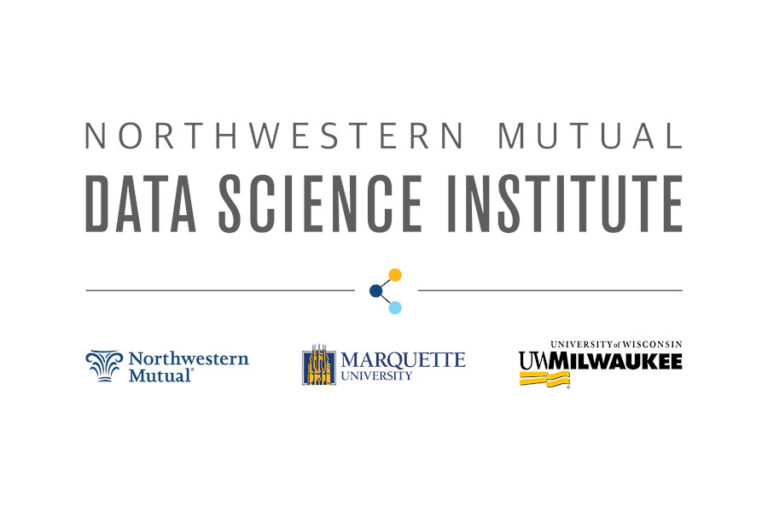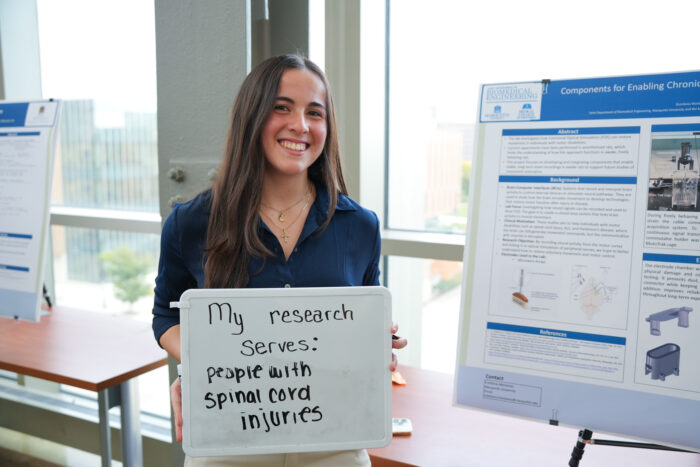This fall, as a part of its Center of Excellence (COE) initiative, the Northwestern Mutual Data Science Institute announced three innovative programs and engagement opportunities with its university partners, Marquette University and University of Wisconsin-Milwaukee.
Centered around the NMDSI’s five COE focus areas – artificial intelligence, AI and data bias and ethics, behavioral economics, financial literacy, and health and wealth inequities – each of these programs will serve to accelerate a robust ecosystem for research and innovation, talent pathways, and community outreach and partnerships. To foster broader inclusion and cross-institution collaboration, the NMDSI received nearly 40 proposals for cohort-modeled opportunities, internships, research engagement, and curricula development.
The NMDSI awarded up to $500,000 in research dollars as part of the Paving ROADS Seed Fund Program, $100,000 on behalf of the Pioneer Collaborative Curricula Program, and $75,000 for the NMDSI Student Research Scholars Program.
Marquette representatives are involved in the following awarded projects:
Paving ROADS Seed Fund Program
This annual program aims to support new research partnerships to forge short- and long-term engagement among NMDSI affiliated faculty and data science experts across disciplines while strengthening cross-campus research to use data science for social and societal impact in Milwaukee and beyond.
Does More Money Buy Better Health?
Machine Learning based novel causal estimation methods for analyzing evidence from 500 largest U.S. cities including Milwaukee
- Dr. Avik Chakrabarti, associate professor of economics at UW-Milwaukee, and Dr. Sabirat Rubya, assistant professor of computer science in the Klingler College of Arts and Sciences
- Abstract: A fundamental problem with making international comparisons of well-being is that there is no standard metric for health, as opposed to the very standardized measurement of income. In this project, standardized measures of health disparities and income inequalities obtained from granular data on census tracts will be used to identify if disparities in health and inequalities in income are prevalent.
Towards a Comprehensive Framework and Repository for Documenting and Assessing Biases in Using Large Language Models in Health
- Dr. Lu He, professor of public health at UW-Milwaukee, Dr. Priya Deshpande, assistant professor of electrical and computer engineering in the Opus College of Engineering, and Dr. Praveen Madiraju, assistant professor of computer science in the Klingler College of Arts and sciences
- Abstract: The recent emergence of LLMs such as ChatGPT brought increasing excitement in using AI in the health domain. However, there is evidence that LLMs may have real-world biases such as gender, racial, and age biases that could harm patients, especially those who are underrepresented. The goals of this project are to generate a comprehensive framework that builds on how to conceptualize and assess biases in using LLMs in the health domain and create and publicize a repository that documents and continuously updates these biases.
Speech-Mediated Robot-Assisted Therapy
Upper limb rehabilitation using smart assistant empowered by OpenAI
- Dr. Mohammad Rahman, associate professor of mechanical engineering at UW-Milwaukee, Dr. Susan McRoy, chair and professor of computer science at UW-Milwaukee, Dr. Inga Wang, associate professor of occupational therapy at UW-Milwaukee, and Dr. Sheikh Iqbal Ahamed, professor of computer science in the Klingler College of Arts and Sciences
- Abstract: Aimed at revolutionizing robotic rehabilitation therapy, the project’s core objective is to develop an intelligent user interface that harnesses the contextual awareness of OpenAI and voice-activated technology, exemplified by Amazon’s Alexa. This innovative approach seeks to overcome the limitations of current robot-assisted rehabilitation therapy, including restricted customization, complexity, diminished human interaction, constrained motion and task variability. By promoting patient-centered care and leveraging technological advancements, the project has the potential to transform rehabilitation therapy delivery and enhance the quality of life for patients.
Multi-Modal Ranking Models for T-Cell Receptor-Epitope Binding Prediction
- Dr. Keke Chen, associate professor of computer science (Marquette)
- Abstract: Accurate identification of TCR-epitope recognition is critical for understanding a functioning adaptive immune system and designing immunotherapy methods. Since the traditional web-lab approach is slow and expensive, machine-learning-based TCR-epitope binding prediction has become an emerging approach complementing the traditional one. This research will address the scarce training data issue and help develop several methods to explain the model prediction and link the model output to critical amino acids and structural features.
UbiWhite
Smartphone-based non-invasive white blood cell counting system from fingertip videos
- Dr. Sheikh Iqbal Ahamed, professor of computer science in the Klingler College of Arts and Sciences
- Abstract: This project introduces a groundbreaking solution aiming to transform healthcare by presenting a noninvasive, smartphone-based system for real-time counting of white blood cells (WBCs). White blood cells, critical components of the immune system, defend the body against infections and foreign substances. Our proposed system circumvents limitations such as invasive blood draws and laboratory testing by leveraging the optical and magnetic properties of WBCs to enable real-time counting without the need for blood samples. Ultimately, this system will enhance patient outcomes, facilitate early disease detection, and contribute to the advancement of personalized and precision medicine.
Pioneer Collaborative Curricula Program
The Pioneer Collaborative Curricula Program seeks to introduce and embed emerging areas of data science into the curricula of our two university partners. We will engage NMDSI faculty to support the development of novel and advanced data science courses to supplement or expand existing curricula.
Data Science for Public Policy
- Dr. Amanda Heideman, teaching assistant professor of political science in the Klingler College of Arts and Sciences
- Abstract: The course, “Data Science for Public Policy,” aspires to address the increasing demand for novel interdisciplinary learning opportunities that illustrate how the latest developments in data science can help to improve the analysis of public policy. This 15-week course, open to graduate and undergraduate students alike, will help participants develop vital, hands-on experience with analyzing real microdata and applying data science skills to analyze real social problems, using large quantities of data from a variety of sources.
Digital Health Using Data Science
- Dr. Sheikh Iqbal Ahamed, professor of computer science in the Klingler College of Arts and Sciences
- Abstract: Dr. Ahamed’s “Introduction to Digital Health Data Science” class strives to offer a holistic understanding of the intricate intersection between healthcare and data science. In our rapidly evolving healthcare landscape, the strategic utilization of digital health data stands as a linchpin for well-informed decision-making, nuanced policy formulation, and the enhancement of patient outcomes. The course accentuates the escalating prevalence of chronic diseases, the challenges posed by an aging population, and the overarching strain on global healthcare systems. The goals of this course are to empower healthcare professionals to adeptly employ data-driven approaches for personalized patient care, provide researchers with the tools to extract meaningful patterns from expansive datasets, and equip policymakers to make informed decisions grounded in statistical evidence.
Student Research Scholars Program
The NMDSI Student Research Scholars Program seeks to engage students from our partner institutions in data science research, working with NMDSI affiliated faculty and data science experts in and cross disciplines to give them a hands-on experience in the application of data science. Some of the projects will include working with faculty on sponsored research and some will be in the nonprofit community of Milwaukee under the supervision of a faculty mentor. The program will provide students with a stipend over the semester.
Predicting Risk of Obstructive Sleep Apnea and Cancer Susceptibility Post Long COVID Using Integrative Data Analytics and Artificial Neural Network Insights
- Manoj Rajesh Purohit, Ph.D. candidate in computer science at Marquette
- Abstract: “Long COVID,” characterized by persistent symptoms following COVID-19, presents notable health concerns. Its intersection with obstructive sleep apnea (OSA) is significant due to shared issues such as irregular breathing, disrupted sleep, and cardiovascular risks. This research aims to investigate the increased risk of OSA in Long COVID patients, exploring connections between Long COVID severity and the development of OSA influenced by chronic diseases and disruptions in sleep patterns. The primary objective is to examine OSA risks in individuals with Long COVID compared to those without.
Crafting Digital Story Narratives Using GenAI to Facilitate Social Support for Postpartum Depression
- Farhat Tasnim Progga, Ph.D. candidate in computer science at Marquette
- Abstract: Social support is crucial for managing postpartum depression (PPD) symptoms. Women without adequate social support are five times more likely to experience PPD. This project will explore the effectiveness of digital storytelling in the context of online social support for women with perinatal mental health illnesses through a series of empirical and design inquiries.
Rating of the importance of personal information in cybersecurity
- Tianyang Xiong, graduate student in computer and information sciences at Marquette
- Abstract: This project revolves around assigning varying levels of vigilance to different types of personal information in the context of personal cybersecurity. The proposed approach involves analyzing data related to cybercrimes targeting individuals to identify prime targets for fraud, the types of information fraudsters seek, data collected by perpetrators to obtain other personal details, and the success rates of cybercrimes targeting specific information. This analysis aims to establish a rating system for the importance of personal information, facilitating targeted and efficient preventive measures.
Learn more about all three COE programs and the 2024 recipients on the NMDSI website.



